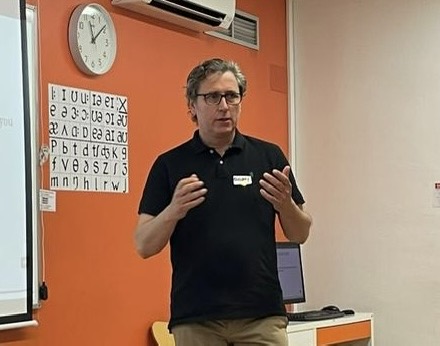Efficient language learning
- Barnaby Griffiths

- Feb 13, 2025
- 3 min read
I’m sure many experienced language teachers would agree with me when I say that although it may be the most efficient way to teach a language, a one-size-fits-all approach to language learning makes little sense and is in fact quite inefficient for learners, given the different needs and learning styles of a group of students.

When I was an English language teacher, despite investing so much time planning lessons to cater to all of my students’ needs and learning styles, it always felt like a Sisyphean task. No one approach or methodology would meet all the group’s needs. And while the obvious solution of a one-to-one approach allows teachers to tailor their classes to meet all of their students' needs, it is viewed is an immensely inefficient, and therefore costly, way of teaching and learning.
However, since becoming a language and communication coach, I now see one-to-one and small group sessions as an effective solution to the above problem. And that is because coaching works differently to teaching, providing clients with the tools and strategies to become independent language learners and requiring less and less of the instructor’s time as they progress with their learning.
A language and communication coach’s job is therefore to help learners become self-sufficient language learners and communicators, rather than making them hugely reliant on the instructor and their next lesson. I should add here that coaching need not be one-to-one, as group coaching is also highly effective, and language learners forming their own groups to practise and rehearse language without the presence of a guiding figure also constitutes a very useful complement to the activity of formal language and communication coaching.
How language and communication coaching is both efficient and effective
Language and communication coaches share the secrets of language learning with their learners, allowing them to grow not only as learners, but also as communicators, and in no small way as human beings, by compassionately - and passionately - accompanying them on their journey to acquire a second language. This requires fairly intensive coaching at the beginning, before gradually letting go of the reins and allowing learners to find their own level of independence. The apparent inefficiency of working one-to-one or in small groups is therefore overcome by the inherent efficiency of the coaching process.

Allow me to illustrate: a language student is accustomed to paying a given amount for a language course that will “get them through” a certain level of language learning, e.g. pre-intermediate. Spreading the cost of this over a number of students allows language schools and teachers to form supposedly homogeneous groups of students, who all study together with one teacher.
In my experience, what then happens is that students engage in a lengthy series of lessons that a) must meet the scheduling preferences of all involved and b) necessarily entail a one-size-fits-all approach to language teaching and learning, rendering the whole learning experience vastly inefficient. To paraphrase Abraham Lincoln, “You can meet all of your students’ needs some of the time, and some of your students’ needs all of the time, but you can’t meet all of your students’ needs all of the time”.
And there is a knock-on effect of this: as students become accustomed to inefficient teaching, i.e. long parts of classes and courses not directly addressing their language learning needs, their motivation decreases, and with it their commitment and possibly attendance, but most importantly the effectiveness of the process, until we find a group of students going through the motions of passing another end-of-year exam to get to the next level, without any great leap in their progress, despite having invested a year of their life studying a language. Let’s be clear: over a year of your life, you should be making a huge leap in terms of your communicative ability in a second language, and that is what the efficiency of language and communication coaching will bring you.

To sum up then, with language and communication coaching, after a given number of contact hours with the coach, which will have a similar cost to that year of group classes we mentioned, the learner will have planned their learning goals and been equipped with the tools, strategies and materials to learn a language in a personalized manner at their own pace, gradually reducing their reliance on the instructor. In this way, they become independent language learners who make swift progress on a rewarding language learning journey to meet self-established communicative milestones and goals.
-----------------------------------------------------------------------------------------------------------------
If you would like to know more about language and communication coaching (LCC), whether as a learner or as a language teacher, contact me for a free consultation at barnaby@bglc.es.

Comments